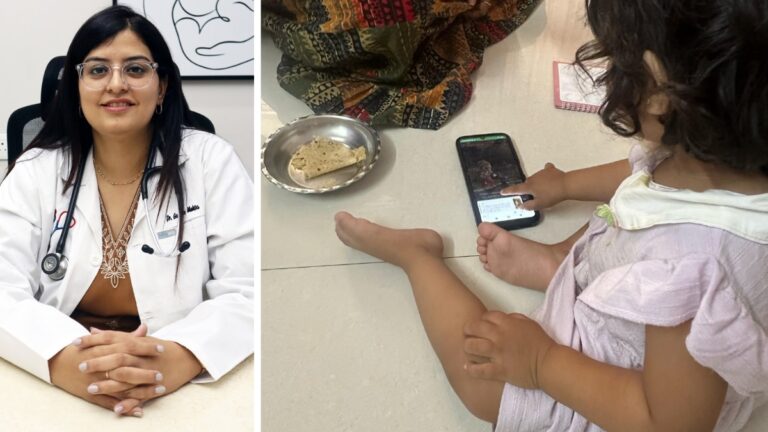In today’s digital age, screens are an integral part of our lives. From online learning to social interactions, children in 2025 are more connected than ever. While technology offers numerous benefits, excessive screen time can have significant impacts on a child’s physical, mental, and emotional well-being. As a pediatrician, I often counsel parents on how to strike a healthy balance between screen use and other essential activities.
This guide will help parents navigate screen time for their children, ensuring a balanced and healthy digital experience.
The Impact of Excessive Screen Time on Children
Studies continue to highlight the effects of prolonged screen exposure on children. Some key concerns include:
1. Delayed Development in Young Children
Children under five are in a critical stage of brain development. Excessive screen exposure can limit their ability to develop essential social, cognitive, and motor skills. The World Health Organization (WHO) recommends minimal screen time for children under two and no more than one hour daily for those aged two to five, with a focus on high-quality content.
2. Sleep Disruptions
The blue light emitted from screens suppresses melatonin production, making it harder for children to fall asleep. Poor sleep can lead to behavioral issues, decreased concentration, and even weakened immunity. Parents should enforce a screen-free bedtime routine at least one hour before sleep.
3. Increased Risk of Obesity
Sedentary screen time can contribute to childhood obesity. Many children prefer gaming or watching videos over outdoor play, reducing their physical activity. Additionally, screen time is often associated with mindless snacking, leading to unhealthy eating habits.
4. Emotional and Behavioral Challenges
Overuse of screens can lead to irritability, attention difficulties, and even anxiety or depression in children. Social media exposure can impact self-esteem, and excessive gaming may contribute to addictive behaviors.
5. Reduced Family and Social Interactions
Excessive digital engagement can replace face-to-face interactions, impacting a child’s ability to develop meaningful relationships. Children need real-world social interactions to build emotional intelligence and communication skills.
Setting Healthy Screen Time Limits in 2025
With technology integrated into education and daily life, completely eliminating screens isn’t practical. Instead, a balanced approach is key. Here’s how parents can manage screen time effectively:
1. Follow the 5:2:1 Rule
Many pediatricians recommend a structured approach to screen time. The 5:2:1 rule suggests:
- 5 hours of physical activity per week
- 2 hours or less of recreational screen time per day
- 1 hour before bedtime should be screen-free
This helps children maintain a balance between digital and physical activities.
2. Prioritize Quality Over Quantity
Instead of focusing solely on the amount of screen time, ensure children consume high-quality, educational, and age-appropriate content. Interactive and creative activities such as coding, digital art, and educational games are preferable to passive scrolling or binge-watching videos.
3. Encourage Screen-Free Zones and Times
Establish screen-free zones, such as dining areas and bedrooms, to promote family bonding and better sleep hygiene. Designate specific hours in the day where screens are put away, encouraging outdoor play, reading, and social interactions.
4. Lead by Example
Children learn by observing their parents. If parents frequently use devices during meals or conversations, children are likely to do the same. Model healthy screen habits by limiting your own screen use and engaging in offline activities together.
5. Monitor Content and Online Safety
With increased online exposure, children are at risk of cyberbullying, inappropriate content, and online predators. Parents should:
- Use parental controls and privacy settings.
- Discuss online safety regularly, emphasizing responsible internet use.
- Encourage open conversations so children feel comfortable reporting any distressing experiences.
6. Encourage Active Screen Use
Not all screen time is equal. Passive consumption (watching videos) differs from active use (learning a new skill, virtual exercise, or creating content). Encourage activities that promote problem-solving, creativity, and critical thinking.
7. Balance Digital and Real-World Interactions
Encourage children to participate in offline hobbies such as reading, sports, or music. Organizing family activities that don’t involve screens—like hiking, board games, or cooking—helps strengthen relationships and promotes overall well-being.
Screen Time Recommendations by Age
Infants (0-2 years)
- Avoid screen time, except for video calls with family.
- Encourage sensory play, face-to-face interactions, and outdoor experiences.
Toddlers (2-5 years)
- Limit screen time to one hour per day of high-quality, educational content.
- Co-view content with your child and discuss what they are watching.
Children (6-12 years)
- Limit recreational screen time to 1-2 hours daily.
- Balance screen use with outdoor play, reading, and social interactions.
- Introduce screen-free family time.
Teens (13-18 years)
- Encourage self-regulation and responsible use of technology.
- Monitor social media use and promote digital well-being.
- Maintain screen-free mealtimes and a tech-free hour before bed.
The Future of Screen Time Management
With advancements like virtual reality (VR) education, AI-based learning tools, and smart devices becoming more common, screen time will continue to evolve. Instead of fearing technology, parents should focus on guiding children to use it mindfully and responsibly.
Educational platforms, parental control apps, and digital wellness tools in 2025 offer more ways to monitor and balance screen use. However, the foundation of a healthy digital lifestyle remains the same—prioritizing real-world interactions, physical activity, and mindful screen engagement.
Final Thoughts
Screen time in 2025 is a reality that parents cannot ignore. The key is to approach it with awareness and balance. By setting clear boundaries, promoting quality content, and encouraging offline activities, parents can ensure that their children develop a healthy relationship with technology.
As a pediatrician, my advice to parents is simple: Technology should be a tool, not a replacement for real-life experiences. With mindful management, we can raise a generation of children who are both digitally savvy and emotionally well-rounded.
Dr. Garima Mehta is a practicing Pediatrician from Surat. Views expressed above are the author’s own.


